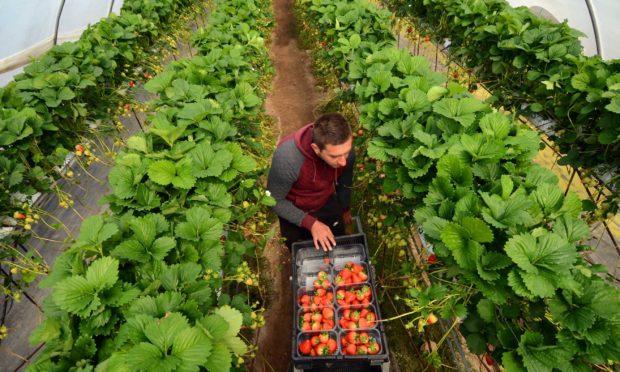Worker shortages are forcing farmers to consider shutting down their fruit and vegetable operations, MPs have been told.
Scotland’s soft fruit industry, which is centred in Tayside and Fife, is worth £115 million a year to the economy.
Jonnie Hall, for the National Farmers Union, said a Home Office pilot scheme for seasonal migrants will do little to fix the labour crisis that is threatening the “very valuable” sector.
Mr Hall told the Scottish Affairs Committee the fruit-picking industry “punches above its weight” but will struggle to survive because of workforce problems alone.
“Decisions will be taken now about future investment (on fruit farms) – or indeed do we actually stop doing this and start putting the land back into cereals or whatever it might be?” he said on Monday.
In September, the Home Secretary announced a pilot lasting a minimum of two years to provide an annual temporary workforce to British farms of 2,500.
Mr Hall said: “The numbers just don’t stack up.
“That’s glaringly obvious from the situation we have found ourselves in today, talking about basically an allocation or a quota of 2,500.
“You are going to be left with key shortages of seasonal workers at key times of the year, leaving fruit and veg unpicked, unharvested to essentially rot.”
Growers in Courier Country have reported slashed profits, with tonnes of fruit wasted a year because there are not enough workers available to pick it.
Seasonal labour shortages in the UK have worsened as eastern European economies improve, the value of the pound falls and the local workforce all but disappears.
Brexit has also put off some migrants from coming here, farmers report.
Kirstene Hair, the Scottish Conservative MP for Angus, said the scheme is a “step in the right direction” rather than a “silver bullet”.
“Clearly there are still gaps in terms of labour,” she said.
“I have raised this issue again in parliament on Monday in a debate on the Immigration Bill.
“I will continue to push the government to make sure that this vital Scottish industry has access to the workers it needs and closely monitoring the uptake on the pilot scheme when it is launched in the spring.”








